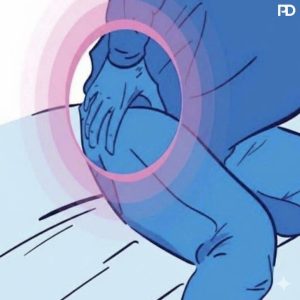Last Thursday began like every other night the narrator had endured since the death of her five‑year‑old son two years earlier—restless, hollow, and filled with an oppressive quiet that made the house feel watchful. She cleaned long past midnight just to silence her thoughts, until three gentle knocks broke the stillness. At first she froze, then a small trembling voice came through the door: “Mom… it’s me.” The familiarity of the voice shattered her. It was her son’s voice—the same soft cadence she had memorized before burying him in a tiny casket covered in blue flowers. Disoriented and terrified, she followed the voice to the door, unsure whether grief was playing tricks on her mind or something impossible was happening just beyond the threshold.
When she opened the door, a barefoot little boy stood shivering on the porch wearing the exact rocket‑ship shirt her son Evan had worn the night of the accident. Everything about him matched the child she lost—his brown eyes, freckles, even the stubborn cowlick in his hair. He stepped inside naturally, calling her “Mommy” and asking why she was crying. Struggling between hope and horror, she asked who he was, only for him to insist that he was Evan and that he had “come home.” When she told him her son had died, he seemed confused and frightened, explaining that he had been living with “the lady” who told him she was his mother. Terrified for him and overwhelmed, the narrator called 911 despite Evan’s pleas not to involve the woman he had lived with. Officers arrived quickly and brought them to the hospital, where both the narrator and the boy underwent DNA testing.
During the excruciating wait for results, Evan clung to her sleeve, begging her not to leave. When the results finally came back, the nurse confirmed a 99.99% probability that she was his biological mother—and that he was also the biological child of her late husband. The revelation was staggering; she had buried the wrong child. Detective Harper then explained the unimaginable truth: two years earlier, during a breach at the state morgue, several remains went missing. Evidence suggested that Evan had been abducted before ever reaching the morgue by a woman named Melissa, who had lost her own son and had taken Evan as a replacement. Evan’s memories confirmed this—Melissa called him different names depending on her mood, and a man he called “Uncle Matt” eventually realized the truth and helped him escape, driving him to his real home. Though Child Protective Services suggested placing Evan in temporary care, the narrator refused, with Harper supporting her decision.
When she brought Evan home that night, he moved through the house with instinctive familiarity—opening the correct cabinets, finding his favorite shark cup, and retrieving his beloved stuffed T‑Rex. His bedroom, preserved exactly as he left it, made him pause with quiet awe before asking if he could sleep there. Settling into his rocket‑ship sheets, unchanged since the night he vanished, he whispered, “Is this real? Not a dream?” She assured him it was real and that he was safe. In the following days, Melissa was arrested and “Uncle Matt” turned himself in, leaving the narrator with complicated feelings of anger and reluctant gratitude. Meanwhile, Evan battled nightmares and separation anxiety, terrified she might disappear or that Melissa might return. She soothed him with constant reassurance, promising he would never be taken again.
Life after Evan’s return became a blend of healing and chaos—therapy sessions, paperwork, legal proceedings, and emotional aftershocks. Yet amid the fear and the mess, the narrator found pieces of motherhood she thought had been lost forever: Evan’s sticky hands cupping her face, his Lego creations scattered across the floor, the excited “Mom, look!” echoing through the house like a miracle. He began following her everywhere, unwilling to let her out of sight for even a moment, and she remained patient, understanding the depth of trauma he carried. Slowly, their routines knitted together again. The house, once painfully silent, now echoed with the sounds of a boy rediscovering home—coloring at the table, laughing softly, testing the safety of each room with cautious wonder.
One evening as they colored side by side, Evan looked up and said, “I like home better.” The narrator felt her heart break and mend all at once, whispering, “Me too.” At night, she stood in his doorway just to watch his chest rise and fall, reassuring herself he wasn’t a dream. She reflected often on the moment two years earlier when she had watched a casket disappear into the earth, believing it held her child. That loss had carved a permanent hollow in her life—but last Thursday, three soft knocks had brought the impossible to her doorstep. Now, as Evan slowly healed and the two of them rebuilt their existence piece by piece, she understood that despite the horror and the years stolen, the most important truth remained: her son had found his way back home.





